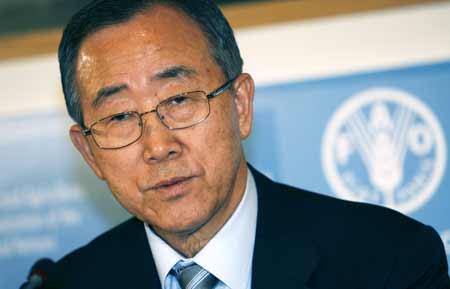
United Nations Secretary General Ban Ki-moon speaks during a press conference at a UN crisis summit on rising food prices at the Food and Agriculture Organisation (FAO) in Rome June 4, 2008. (Xinhua/Reuters Photo)
World leaders hammered out a common response Thursday to the global food crisis after three days of wrangling at a United Nations summit amid soaring food prices.
"We firmly resolve to use all means to alleviate the suffering caused by the current crisis, to stimulate food production and to increase investment in agriculture," delegates from around 180 countries, including 44 leaders, said in a declaration.
"We commit to eliminating hunger and to securing food for all today and tomorrow," the declaration said.
In the declaration, world governments pledged to take urgent action to prevent soaring food prices from pushing millions of people into hunger, boost investment on agriculture for increase of output and ease trade restrictions.
The three-day summit, hosted by the UN Food and Agriculture Organization (FAO), was called at a time when the world is experiencing a dramatic increase in food prices.
Agricultural commodity prices rose sharply in the past two years and continued to rise even more sharply in the first three months of 2008, with foodstuff such as rice, corn and wheat all reaching record highs, sparking riots in many countries and worsening the situation of the 850 million people already affected by chronic hunger.
The declaration called on donors and UN organizations to provide more aid for developing countries.
UN Secretary General Ban Ki-moon told the summit that global food output should rise by 50 percent by the year 2030 to meet the rising demand and as much as 15 billion to 20 billion US dollars would be needed yearly to boost production.
Though everybody is committed to "eliminating hunger and to securing food for all," world governments found it difficult to agree on how to do.
Biofuels proved to one of the sticking points, with the growth of biofuel production, notably in the United States, the European Union and Brazil, widely blamed for the food price hike.
The declaration took a mild tone by saying biofuels present both "challenges and opportunities" and calling for more research on their effect on food security and climate change.
"I think that we have achieved the results that we were hoping for," said FAO Director General Jacques Diouf at a final press conference which was put off several hours due to squabbling among governments.
"This should enable us to resolve some of the most important problems of our times – the problem of hunger in the world, the problem of food production in the world, the problem of the demand for food products," he said.
(Xinhua News Agency June 6, 2008)